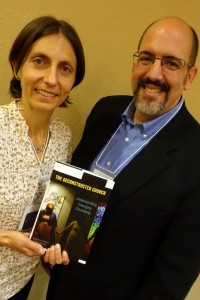 My 2014 book, The Deconstructed Church: Understanding Emerging Christianity, co-authored by Gerardo Marti, has been reviewed by Ralph Kunz of the University of Zurich in the academic journal Ecclesial Practices (2016, V3(1): 150-153).
My 2014 book, The Deconstructed Church: Understanding Emerging Christianity, co-authored by Gerardo Marti, has been reviewed by Ralph Kunz of the University of Zurich in the academic journal Ecclesial Practices (2016, V3(1): 150-153).
You can read the full review on academia.edu.
I have reproduced some excerpts below.
The Deconstructed Church Reviewed by Ralph Kunz
… Marti and Ganiel offer a comprehensive social-scientific analysis of the development and significance of the ecm. Their ethnographic observation of emerging congregations, pub churches, neo-monastic communities, conferences, and online networks are based on in-depth interviews and congregational surveys in the us, Ireland, and the uk. The authors’ work contributes to the investigation and exploration of the sociological significance of emerging Christianity (ecm). Marti and Ganiel say , “Although much is unknown, our research leads us to conclude that the ecm is one of the most important reframings of religions within Western Christianity in the last two decades. As social scientists, we do not attempt to provide an argument in support of or against the movement. Rather we describe the workings of the movement and evaluate the significance” (5).
… Marti and Ganiel provide a convincing argument that the ecm will persist and even develop because the movement fits with the dominant religious individualism and pluralism in Western societies. They are embedded agents. Thus, while the participants say they are rebelling against their previous Christian traditions, Emerging Christians are dependent on established structures for actualizing their own deconstructed religious orientation. Conformity is a threat to organizations like emerging congregations that are concerned with distinctiveness and diversity as well as reacting to dominant forms. Therefore, Emerging Christians find it necessary to reinvent congregations as they know them from past experience (194). The principles with which it operates are pervasive within contemporary religions and substantially grounded in broad social changes. “The patterns of religious individualism, the formation of pluralist congregations, the allowance for multiple forms of legitimate spirituality, and the desire to strategically construct a personal faith that is valid and even strengthened by life lived in the real world will be ubiquitous elements of modern religiosity” (195).
The book ends with a most convincing conclusion. Intermediately, Marti and Ganiel enlarge and solidify their description of pluralist congregations (34–56), what it means to be Emerging Christians (57–77), how faith is expressed and shaped in conversation (78–108), and traditional congregational practices are deconstructed (109–133). ecms are maybe messy. Nonetheless, the red thread about the nature of truth, doubt, and God, and innovations in preaching, worship, the Eucharist, and leadership remain behind the new ideas: it is all about following Jesus in the real world (134–161).
The Deconstructed Church is more than a well-written book. Marti and Ganiel provide a very balanced and solid overview of emergent Christianity. The authors interpret the ecm as an expressive and developing shape of religious individualization and pluralization. The idea is eye opening and plausible. Still, the discussion remains open in relation to the intensity and which form of self-deconstruction of the Christian religion occurs when other preconditions prevail than in the us or Northern Ireland, for instance, in non-denominational areas of Eastern Germany. An in-depth discussion should also try to make a systematic comparison with other older alternative movement types. Max Weber’s charisma-concept would work well here. Winfried Gebhard defines a sociology of alternative life forms in Charisma als Lebensform (1994) in which he portrays fascinating parallels between the Monk’s movement and radical pietism. Perhaps the individualization thesis is too thin to serve as a theoretical foundation for the thick description of the social shapes of Christian life in contemporary societies.
If ‘Emerging Christianity’ …. ‘is all about following Jesus in the real world’ it is no longer Christianity. Is it a re-emergence, after 2000 years, of what could be called ‘Jesuanity’ i.e. following the teachings attributed to Jesus; teachings delivered in a Jewish culture in a multicultural Roman Empire?
The ‘Christ’ label and concept (borrowed from ancient Egypt) was applied to Jesus posthumously by the inventors of Christianity.
Is it time to return ‘Christ’ to the tomb and resurrect Jesus? Is the term ‘Christianity’ now obsolete?